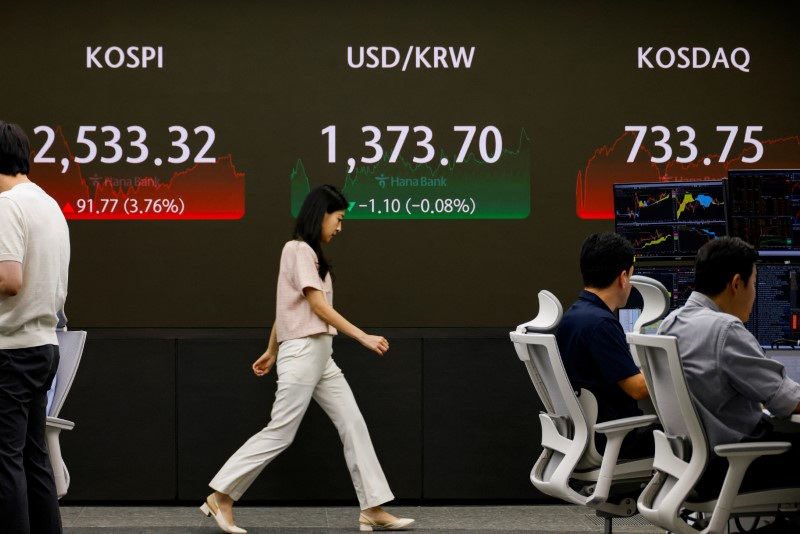By Jihoon Lee and Cynthia Kim
SEOUL (Reuters) - South Korea's mom-and-pop investors are defying last week's global financial markets rout by pouring even more funds into U.S. stocks, a years-long trend that analysts and investors bet will continue due to the depressed value proposition at home.
South Korean retailers have been scooping up Nvidia (NASDAQ:NVDA), Tesla Inc (NASDAQ:TSLA). and Apple shares (NASDAQ:AAPL) this year fuelled in part by the worldwide AI-frenzy, a move that comes despite government efforts to boost the domestic stock market.
Sunny Noh, a 49-year-old who has been investing in Tesla since 2020 and now holds about 85% of his financial assets in the electric-vehicle maker, said he sees the recent market plunge as a long-term buying opportunity.
"It can fall in a year or two, but it will rise again in the longer term of 10 years," he said.
Retailers like Noh have been frustrated by the so-called "Korea discount" of lower shareholder returns and depressed valuations in the $1.8 trillion stock market, home to global tech titans like Samsung Electronics (KS:005930) and SK Hynix and automakers such as Hyundai Motor.
For South Korean listed companies, the last 10-year ratio of dividend payment to net income, for instance, stood at an average of 26%, lower than 55% in Taiwan, 36% in Japan and 42% in the U.S., according to the Financial Services Commission.
Investors are even more disappointed that Samsung and Hynix aren't in the forefront of the AI-boom. Shares of Samsung are down 4% so far this year versus a 120% surge for Nvidia. Hynix has fared better, up 25%.
The past 10-year price-to-book ratio for Korean companies sits at an average of 1.04 versus 3.64 for the U.S.
These numbers partly explain why retailers, popularly known as "ants" because of their massive 14-million number and capacity to act as a powerful collective force, have been investing in droves in overseas markets for well over a decade.
Ants like Noh bought $9 billion worth of U.S. stocks between January-July this year, after selling $2.8 billion in 2023 - the first sell-off after three years of a U.S. stock investment boom.
They sold a record-high 16.3 trillion won ($11.9 billion) worth of domestic stocks in the same period, driving the KOSPI down 1.3% so far this year when the S&P 500 and Nikkei jumped 13% and 5%, respectively.
To be sure, foreign buying of Korean stocks between January-July also rose to a record 27 trillion won, but they accounted for 27% of average daily turnover versus 54% for retailers.
FALTERING AMBITIONS?
The retail-outflow trends spell trouble for the Yoon Suk Yeol's government-driven ambitions to boost depressed stock valuations. A planned capital gains tax, slated for next year, is also expected to discourage investors although Yoon has promised to scrap it.
Oh Jeong-min, a 42-year old retail investor who lost about 10%, or around 100 million won ($73,012) from his domestic and U.S. stocks during last week's market shakeout, says he has recouped some of the losses and plans on buying more U.S. shares "when the time is right."
"The kind of dividend payout and shareholder return trend I see in U.S. companies is simply hard to spot in Korea," he said.
Noh and Oh are part of a group of eight analysts, investors and government officials who told Reuters they expect the fund-outflows trend to continue as an ageing population seeks higher returns.
"We are aware of the trend and the objective of the Value-up Programme is to vitalise investment among not only retail investors but also institutional and foreign investors by making the domestic stock market more competitive," an official at the Financial Services Commission said.
In February, the government proposed a "Corporate Value-up Programme", mirroring Japan's capital market reforms, which includes tax incentives to attract retail investors.
Many analysts say the programme will probably have only a modest impact due to opaque governance structures of South Korea's family-run "Chaebol" conglomerates, where controlling families usually pass down stakes to the next generation at low market value.
"While in Japan, the mere directive from the stock exchange to make improvements was apparently sufficient to effect change, it is doubtful whether government persuasion alone will be sufficient in Korea, at least for Chaebol groups," analysts at Mondrian Investment Partners said in a note.
In early July, Elon Musk called South Koreans "smart people" in an X post, after data showed Tesla was the top U.S. stock held by South Koreans. Their holdings stood at $13.6 billion as of end-July, followed by Nvidia at $12 billion and Apple at $5.1 billion.
"South Korea has become a remarkable market in Asia, with the size of South Koreans' investment in U.S. stocks now exceeding Japan's," said Seungyeon Kim, CEO at Toss Securities.
Oh, the retail investor, is betting on more upside for U.S. stocks.

"There's no doubt that as an investor, you should choose the U.S. market if you think long-term."
($1 = 1,369.6200 won)
